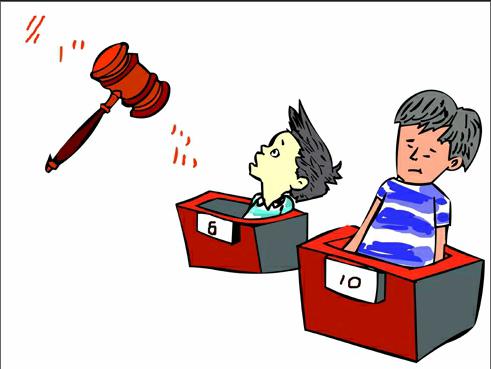Is It Right to Lower the Age of Limited Civil Conduct Capacity?
2016-08-17

A draft of general rules stipulating the basic principles of Chinas Civil Code was submitted to the top legislature for its first reading in late June. The passage of the rules will be the first step in compiling the all-encompassing Civil Code. Over the past decades, China has enacted a number of laws on managing civil affairs, such as the Property Law and the Contract Law, but has yet to integrate them into a comprehensive code.
One of the changes in the draft is the lowering of the minimum age at which minors are deemed to have limited capacity for civil conduct from 10 to 6. The draft stipulates that minors aged between 6 and 18 years are persons with limited capacity for civil conduct. They can independently carry out civil acts purely to benefit themselves or civil acts matching their age and intelligence. According to current regulations, those under the age of 10 have no civil conduct capacity, and responsibility for their civil acts is assumed by their guardians, usually their parents.
The reason given for lowering the age to 6 is that, with social and educational progress, minors nowadays are more mature psychologically and have access to more social activities than before. Lowering the age, therefore, protects their rights in civil acts appropriate to their age and intellectual level.
Some argue, however, that civil acts do not consist simply of buying lollipops and toys, and its quite doubtable whether a 6-year-old child really knows what to do when encountering relatively complicated scenarios.
Adapting to social progress
Jin Zegang (news.ifeng.com): After the modification, a child between the ages of 6 and 10 will receive less legal protection and will have to take more legal responsibilities.
The current General Principles of the Civil Law, which was adopted in 1986, sets 10 as the lowest age at which people have limited capacity for civil acts. In the past three decades, however, Chinas society has undergone tremendous changes, and the improvement of living conditions and the development of Internet technology have contributed to more diversified ideas among the young. They tend to know more than previous generations at the same age. In this situation, it seems necessary for some changes to be made. If laws remain too far behind the advancement of society, not only will dealing with current cases be inefficient, but gradually, the statutes will lose credibility and authority among the public.
As for the age of limited capacity for civil conduct, more discussion can take place. Although its impossible to conduct a referendum, more channels exist for the public to air views on this issue. At the same time, when it comes to age and accountability, its important to coordinate the ages of civil and criminal liability. The ages of partial and full criminal liability currently stand at 14 and 16, respectively.
Yuan Guangkuo (mzrb.meizhou.cn): In real life, a case upheld by a court in one place can be rejected by a court elsewhere. This results mainly from vague terms in certain laws and regulations.
Laws must keep pace with social development. Why has the proposal been made to lower the minimum age for limited civil conduct capacity to 6? The major reason given is that nowadays, children aged 6 know much more than those of previous generations. They possess a certain amount of independent judgments about many things including their own acts. They should be allowed, therefore, to conduct some civil acts independently in order to better protect their interests.
Issues at stake
Ouyang Chenyu (The Beijing Times): The lowering of the age for limited civil conduct capacity intends to allow minors to engage in civil affairs matching their intellectual development. It respects their independent judgment. It also echoes the regulation that children who have reached the age of 6 must attend school for compulsory education.
Indeed, thanks to rapid social and economic development, children nowadays have more opportunities to broaden their minds, and thus, they are different from previous generations at the same age. Today, children aged 6 are entirely capable of buying food or toys or accomplishing other simple missions.
The issue, however, is that an ability to conduct simple trades does not equate to the concept of having limited civil conduct capacity. According to current regulations, a child at the age of 6 is classified as a person without civil conduct capacity. Such children, therefore, do not need to shoulder legal liability for their behavior, which is assumed by their legal guardians. Under the proposed new rules, however, 6-year-old children will have to take legal responsibility for their involvement in certain acts.
Although the draft rules have put forward several protective regulations, stipulating that children are allowed to conduct civil acts matching their ages and intellectual levels, how shall it be determined whether or not certain behaviors are suitable for a child of a particular age? Buying food may be, but how about purchasing a cellphone? Young children lack social experience, so if they engage in trades by themselves, to what extent will they do so out of their own will, and to what extent will their actions be triggered by those of their counterpart—an adult business person? How can children manage to protect their own interests?
Some people may argue that nowadays children begin to receive compulsory education at the age of 6 when they are already able to communicate with their classmates independently. We must admit, however, that their communication and independent acts happen in a “greenhouse.” These young children are able to buy food or toys for themselves, but its safe to say that they know nothing about economic rules in the marketplace, and thus, they are unable to control the risks brought by their own behaviors. Its not easy for children to begin to take legal liability for themselves at such an age.
Su Zelin (www.npc.gov): The purpose of setting up the concept of limited civil conduct capacity is to ensure fairness and safety in trades, and also to better protect the rights and interests of minors.
Reasons exist why current regulations set the age at 10. First, 10-year-old children generally have finished the first few years of elementary education and are entering a higher stage of schooling, so theyve already acquired certain knowledge from books. Second, these children have already accumulated certain social experience during years of exposure to society, so they have a general idea of the nature and consequences of their behaviors.
Now, the draft rules lower the age from 10 to 6, thereby letting those who have just left kindergarten take on civil accountability. This change fails to take into full consideration young childrens psychological features and their ability to cope with reality.
According to Chinas Compulsory Education Law, children who have reached 6 years of age must attend primary school. But, on the way to and from school, children are accompanied by parents or other guardians, who do not dare to let them mingle with society independently. In this context, such young children lack the necessary social experience and cultural knowledge to support their limited civil conduct capacity.
It is simply improper to entrust a child of 6 with such capacity, and this also harms the childs psychological health. Civil conduct is not equal to buying food and toys; it involves civil rights and duties.
The reasons for reducing the age from 10 to 6 are not solid enough. If the change is justifiable, lowering the age to 8 instead of 6 would be preferable. After two years in primary school, an 8-year-old child should possess certain social knowledge and is thus more likely to cope with civil affairs than a 6-year-old.
